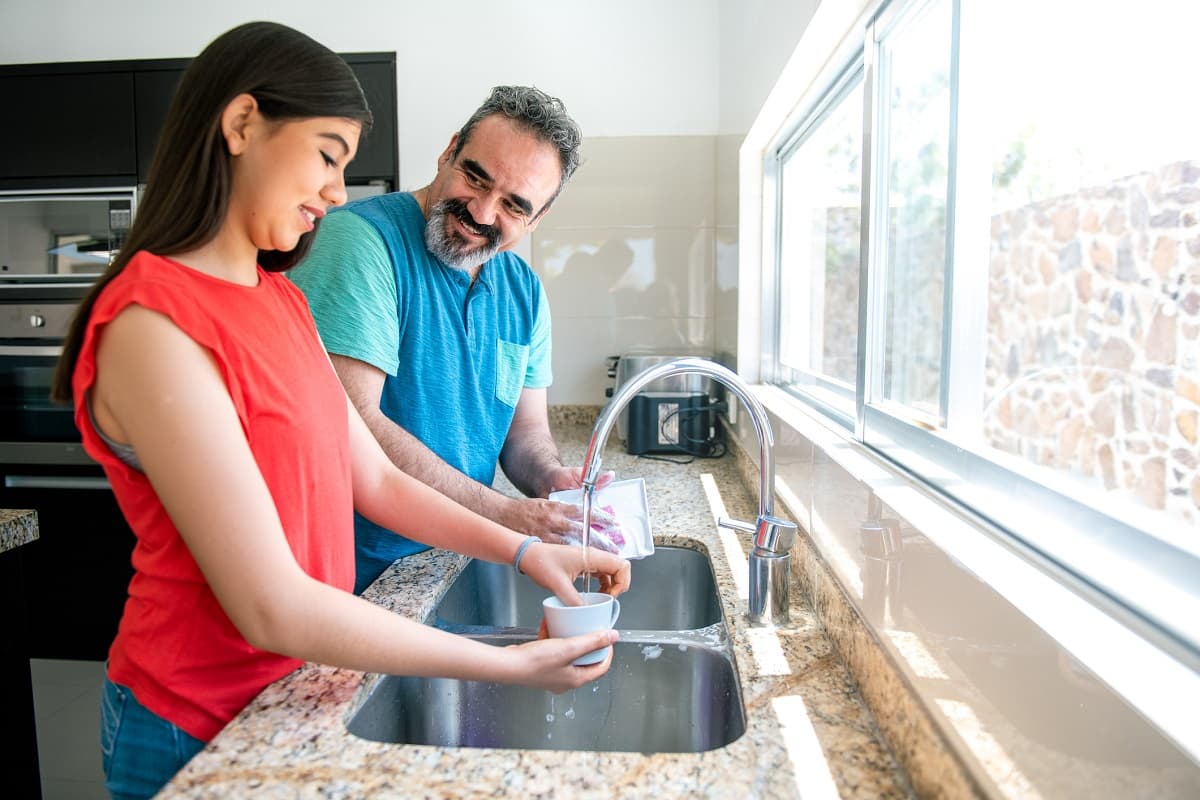Talking to your teen might sound hard when it feels like you’re living on different planets! However, it’s important to try, as the more you and your teen talk, the more likely they will come to you when they need help and support.
Tips on talking and listening to your teenager
Tip #1: Let them know they can talk to you
Being there for your teen and letting them know they can talk to you is one of the best ways you can support them. Make sure you have some time together when you can give them your full attention. It could be in the evening after any younger kids have gone to bed. It could be when you’re doing something else together, such as walking, cooking or driving somewhere. The YoungMinds website has some good suggestions for things you can do together that also give you a chance to talk.
Tip #2: Make the first move
It’s important that your teenager feels they can talk to you. That there’s a safe space where they won’t get in trouble or be laughed at. It might help them open up if you talk about your own feelings. You don’t have to share all your worries with them. But by opening up to them, they’ll see that it’s good to talk about how you feel.
Tip #4: Focus on their interests
Taking an interest in the things they like can help them open up. It’s a good way to start up a conversation, but it also shows them that you care about the things that interest them.
Tip #5: Show empathy
Teens can sometimes be a bit self-centred, so when you’re talking to them about something that’s happened or the way they behaved towards someone, try and discuss how this might have made the person feel. This can help them to see things from other people’s perspectives.
Tip #6: Really listen
Sometimes the best thing to do is just to listen. Don’t always be ready to jump in with solutions or offer your point of view. Sometimes your teenager might just want a sympathetic ear to listen to them and accept and understand what they have to say.
Tip #7: Don’t trivialise the issues they’re facing
Teenage drama might feel so…teenage. But just because it sounds silly to you doesn’t mean it isn’t very real to them. Don’t belittle their problems even if they sound trivial to you. If you do, they might not want to talk to you about their problems again.
Tip #9: Agree to disagree
Try not to let your discussions descend into arguments. It’s important to listen to their opinions and respect them – even if you don’t agree with them. So instead of dismissing their views or shutting them down, try asking them why they think or feel like that. This way, you've more chance of having a discussion or debate, rather than a row.
Tip #10: Let them know that it’s okay to be angry or overwhelmed
If they’re really upset or emotional about something, explain that these feelings are completely normal. And that it's also normal to feel overwhelmed sometimes. This can help them understand that they’re in the same boat as lots of other teens.
However, it’s also important that they know there’s a time and a place and a way of expressing these emotions, so they don’t upset other family members or friends. This page from YoungMinds has advice on helping teens deal with angry emotions positively.
Tip #11: Try to keep it between you
It can be tempting to discuss your teen with other friends or family members. But unless you need advice or support, try not to. It could break down the trust between you, and stop your teen confiding in you again.
If you do need to talk to a friend or family member about your teen, you could ask for their permission first, and then ask the person you talk to not to tell anyone else.
Tip #12: Respect their privacy
No matter how well you get on, they won’t want to tell you everything. As long as they don’t seem distressed, you don’t need to press them for information they don’t want to give you. Having their own secrets is all part of growing up and becoming independent. Did you tell your parents everything when you were a teen?
Tip #13: Stay calm
No matter what your teen tells you, do your best to stay calm. If you get upset or angry, they might not confide in you again. By keeping calm, you’re also showing them a good example, so they can learn to do this themselves.
Our page on coping with parenting when you're raising a teen has tips for helping you stay calm.
Tip #14: Let them know that help is out there
However solid your relationship is, there are things they might not want to talk to you about. There may even be things that you just can’t help with. If this is the case, there are lots of other options available to them.
Young Scot's Aye Feel hub has lots of information for young people how to look after their emotional wellbeing, support from organisations around Scotland and tips on how to promote a positive mindset. They could also call Childline, Breathing Space or the Samaritans to talk to someone anonymously.
If you have twins, triplets or multiples
If you have multiples, the teen years may see them become more independent from each other – and from you. Try to make sure you spend time with them individually, so they have a chance to tell you their thoughts and concerns away from their sibling(s). And make sure they’re able to have some privacy too – for example, you could set up a bathroom rota or give them a place they can store things safely.
You can find more tips and advice for raising teen multiples on the Twins Trust website.
 Activities & Play
Activities & Play Behaviour
Behaviour Childcare
Childcare Development & Growing Up
Development & Growing Up Family, Friends & Relationships
Family, Friends & Relationships Feeding Your Baby
Feeding Your Baby Food & Eating
Food & Eating Health & Safety
Health & Safety Mental Health & Wellbeing
Mental Health & Wellbeing Money & Work
Money & Work Online Behaviour & Safety
Online Behaviour & Safety Pregnancy & First Days
Pregnancy & First Days School & Education
School & Education Sleep
Sleep











 Mental Health & Wellbeing
Mental Health & Wellbeing
 School & Education
School & Education